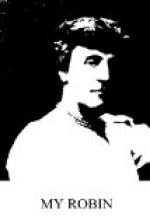The next day summer rains kept me in the house. The next I went to the rose-garden in the morning and sat down under my tree to work. I had not been there half an hour when I felt I must lift my eyes and look. A little indeterminate-colored bird was hopping quietly about in the grass—quite aware of me as his dew-bright eye manifested. He had come again—of intention—because we were mates.
It was the beginning of an intimacy not to be described unless one filled a small volume. From that moment we never doubted each other for one second. He knew and I knew. Each morning when I came into the rose-garden he came to call on me and discover things he wanted to know concerning robins of my size and unusual physical conformation. He did not understand but he was attracted by me. Each day I held myself still and tried to make robin sounds expressive of adoring tenderness and he came each day a little nearer. At last arrived a day when as I softly left my seat and moved about the garden he actually quietly hopped after me.
I wish I could remember exactly what length of time elapsed before I knew he was really a robin. An ornithologist would doubtless know but I do not. But one morning I was bending over a bed of Laurette Messimy roses and I became aware that he had arrived in his usual mysterious way without warning. He was standing in the grass and when I turned my eyes upon him I only just saved myself from starting—which would have meant disaster. I saw upon his breast the first dawning of a flush of color— more tawny than actual red at that stage—but it hinted at revelations.
“Further subterfuge is useless,” I said to him. “You are betrayed. You are a robin.”
And he did not attempt to deny it either then or at any future time. In less than two weeks he revealed a tight, glossy little bright red satin waistcoat and with it a certain youthful maturity such as one beholds in the wearer of a first dress suit. His movements were more brisk and certain. He began to make little flights and little sounds though for some time he made no attempt to sing. Instead of appearing suddenly in the grass at my feet, a heavenly little rush of wings would
[Illustration: A heavenly rush of wings]
bring him to a bough over my head or a twig quite near me where he would tilt daintily, taking his silent but quite responsive part in the conversations which always took place between us. It was I who talked— telling him how I loved him—how satin red his waistcoat was—how large and bright his eyes—how delicate and elegant his slender legs. I flattered him a great deal. He adored flattery and I am sure he loved me most when I told him that it was impossible to say anything which could flatter him. It gave him confidence in my good taste.




